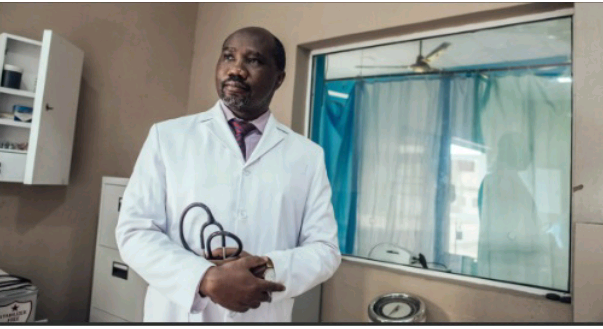To be counted amongst the top 100 most influential people worldwide for the current year is an uncommon feat. Global news giant, Time Magazine, openly celebrates the courage and achievement of Dimie Ogoina, professor of Medicine and Infectious Diseases at the Niger Delta University.
Dimie Ogoina has been named the second most influential Nigerian on Time’s Top 100 Most Influential People in 2023. He follows immediately after Nigeria’s top advocate of democracy, political strategist, and erstwhile kingmaker, incumbent president Bola Ahmed Tinubu.
Ogoina is the Chief Medical Director of Niger Delta University Teaching Hospital (Okolobiri, Bayelsa state). He also doubles as the president of the Nigerian Infectious Diseases Society, and the deputy chairperson of the National Health Research Committee in Nigeria. He specializes in research on HIV/AIDS and antimicrobial resistance.
Dimie Ogoina: His Background
Professor Dimie Ogoina is an indigene of Bayelsa state. He was born into the family of Colonel S.B. Ogoina and Victoria Ogoina in Port Harcourt, Rivers State of Nigeria in February 1974. He attended Government Secondary School, Amassoma, Bayelsa state. Thereafter he proceeded to obtain a Bachelor’s degree in Medicine and Surgery at the Ahmadu Bello University, Zaria (Northern Nigeria).
Ogoina underwent his residency training under Professor of Medicine and Immunology, Geoffrey Onyemelukwe, and Laszlo Egler, another medical expert (at Ahmadu Bello University). He also taught students at the same university.
Ogoina thereafter worked as a consultant physician and lecturer at the HIV/AIDS clinic in Bingham University Teaching Hospital, Jos, Plateau state. He is reputed to have become a professor of Medicine and Infectious Diseases at the Niger Delta University at the age of 40.
Dimie Ogoina’s Net Worth
A certain online source quoted Professor Ogoina’s net worth to be 1.6 billion US Dollars as of 2016. Current information about his assets and net worth are not readily available.
Ogoina: The Global Campaign to Subdue Mpox
Ogoina came gradually into the limelight, not for his qualifications or academic achievements. It is on record that in September 2017, Dimie Ogoina discovered a re-emergence of the Mpox virus in Nigeria. The Mpox (formerly named monkeypox) is of course not a new disease. Ogoina promptly pointed out that the last outbreak of the virus could have been avoided, if the necessary precautions were taken at that time. He promptly began to publish his research findings on the disease.
Ogoina passionately continued to document and present his research work on the Mpox virus in high-profile scientific journals. His red-alert call was largely ignored. Nevertheless, he attempted to prepare global health practitioners against the possible future outbreak of Mpox without relenting. The acclaimed doctor pointed out the strong possibility of sexual transmission of the Mpox infection, based on indicators in his findings.
And he was eventually vindicated. In July 2022, the Mpox came like a wave, spreading first across Europe and the United States. The World Health Organization (WHO) announced a multi-country outbreak of the Mpox; it was quickly declared a Public Health Emergency of International Concern.
The Centres for Disease Control and Prevention (CDC) in its current report, stated that a total of 92,167 infected persons across 110 countries was recorded (as of December 2023). The outbreak claimed 170 lives. Thankfully, Ogoina’s findings became immediately useful for developing effective methods to prevent and control the spread of the disease. The Mpox outbreak lasted all the way into May 2023 when it was eventually curbed.
In keeping true to Ogoina’s earlier discovery, most of the cases of Mpox infection occurred during sexual activity. The largest number of people were infected through skin contact with other persons who had Mpox lesions on their skin, during copulation. While some others acquired the virus via contaminated objects used for skin piercing and tattooing; or as a result of injury.
The Role of Ogoina and Nigeria in the Global Mpox Outbreak
Professor Dimie Ogoina launched a campaign to prevent Mpox from becoming a global epidemic for good reasons. For this reason, it is also important to see how Nigeria took a key position in the spread of the Mpox virus. The 2022 Mpox outbreak is acclaimed to be the largest outbreak of the monkeypox virus in history. Furthermore, Ogoina’s discovery of a re-emerged Mpox infection in an 11-year old male patient, exposed other alarming facts about how it was spread.
The 11-year old boy was brought to Ogoina’s clinic with a strange rash, several large skin lesions, and sores inside his mouth. It appeared like chickepox; but there were evidences he already had chickenpox before then (which was not expected to re-infect him). Ogoina then suspected that it could be monkeypox, a very rare viral disease. Unfortunately, no suitable facility in Nigeria was available to test for the disease.
Samples of the virus were then taken to Senegal and the USA for an analysis; and the test results came back a few days later. The doctor’s suspicion was confirmed. It was monkeypox, the first case that emerged in Nigeria in the last 38 years. More than 20 cases of the same infection were brought to the same clinic over the next few months.
Ogoina and fellow scientists began to trace the spread of the Mpox virus. They discovered that the virus had been transmitted continually between people in Nigeria, for no less than five years (and possibly longer). In that same 2017, about 200 cases of Mpox infection were reported in Nigeria (with more possible unreported cases). And oddly enough, these infections occurred amongst young middle-class men (in their 20s and 30s) living in cities. And the lesions and rashes appeared around their genitals. This was quite unlike cases in the past, when the outbreak was more common amongst children. The doctor and his colleagues quickly figured out that the young boy probably contacted the virus from an older relative.
Upon further investigation, the infected young men were found to have had multiple sex partners, and slept with prostitutes. It became clear that the virus had changed its mode of transmission to include skin-to-skin contact during sex. Whereas in times gone, similar documented cases of Mpox outbreaks across Africa began when a patient came in contact with an infected animal. This meant that the spread of the virus may become faster and more difficult to contain, as people could now directly infect one another.
The Challenge of Not Being Heard
After the discovery, Ogoina tried to warn scientists and health practitioners about his latest discovery on the Mpox virus transmission on several occasions. In one instance, a particular person told him not to report his discovery about skin-to-skin sexual transmission.
Even though the Mpox cases in Nigeria seemed to have died out by the beginning of 2018, that development could not be trusted. Ogoina complained that health officials at Nigeria’s Centre for DIsease Control showed no interest in replying his emails concerning the Mpox discovery. Nor have the country’s health workers bothered to continue investigating cases of monkeypox outbreak, over the years.
But research data on Mpox infection from around the world revealed that the virus had continually been transmitted underground in Nigeria for many years. So the spread of the virus never stopped. To make things worse, there is no documented move (official or unofficial) to immunize Nigerians against the monkeypox virus. A spillover of the outbreak from the country eventually reached the outside world.
Dimie Ogoina and Colleagues Saved the Day: The World Now on Red Alert
Thankfully, the international community is far more serious about curbing the spread of monkeypox, than Nigeria health practitioners have ever done. In Spain, U.K. and the USA, the first diagnosed cases of the Mpox infection spurred their health officials into action. Thousands of people who had been exposed to the Mpox virus or risked getting infected, were immunized.
The Mpox virus may have lain in wait, even incubated in Nigeria. But it also took a Nigerian doctor with a conscience to subdue the disease. All thanks to Professor Dimie Ogoina and his learned colleagues, who did not give up the fight.







